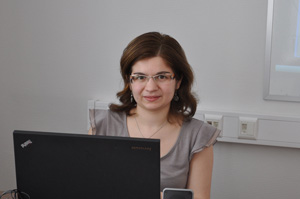Value orientations in business community
Natalia Soboleva presented her report ÂŦValue orientations in business community as a modernization factor in modern RussiaÂŧ on the LSCR`s seminar in 14th of June.
Natalia Soboleva presented her report ÂŦValue orientations in business community as a modernization factor in modern RussiaÂŧ on the LSCR`s seminar in 14th of June.
 Download presentation |  ![]()  Watching the seminar on-line
 Watching the seminar on-line
 The author emphasized that the prospects of modernization are largely dependent upon motivation and value system of business community. It is possible to assume that one of the groups that shares modernization values to the most extent are the actors who are inclined on acquiring new knowledge and skills, in other words, investing into their human capital.
The author emphasized that the prospects of modernization are largely dependent upon motivation and value system of business community. It is possible to assume that one of the groups that shares modernization values to the most extent are the actors who are inclined on acquiring new knowledge and skills, in other words, investing into their human capital.
The objective of the research is to reveal to which extent the values of the Russian business community are in line with modernization. A survey of MBA students (222 persons) conducted by the researcher in three well-known Moscow business schools serves as empirical base. The main hypotheses of the survey are the following: both traditional values (family, material well-being, friends) and work values are important to business community; Russian business community perceives as important not only human capital but also social and symbolic capital; orientation on ethic behavior is not enough present in Russian business community; there is a group among business community whose values are more in line with modernization than of others.
Natalia pointed out three aspects of value orientations: basic values (including professional values), perceived means of achieving career success and orientation on ethic behavior.
Business owners attach relatively more importance to autonomy, independence and relatively less â to interesting job. Value of professionalism is especially important to those who do not occupy managerial positions yet. Autonomy, independence is also of more value to those who work in small companies.
Natalia classified perceived means of achieving success into four groups: human, social and symbolic capital and adherence to business ethics. She defined the combination of factors that reflect modernization values. Among them are high skill level, life-long learning, good education, respect for business ethics, socially responsible business behavior, ability to understand alternative point of view, sociability, amiability, ability to make contacts.
With the help of factor analysis the researcher grouped the perceived means of success into four factors: modernization orientation, social capital versus symbolic capital (positive form), institutionalized human capital versus social capital (social ties) and antimodernization orientation.
Then Natalia demonstrated the relation between values and perceived means of success. Representatives of business community who share the value of autonomy and independence put more emphasis on social capital and leadership skills. Those who consider job content as the main job priority are relatively more oriented on modernization, social and human capital accomplishment. Those who find high income most important stronger express antimodernization orientation. Those who consider career position as a main job priority put more emphasis on prestigious diploma and social ties.
Concerning business ethics and law Natalia found that those who consider law as one of the business ethics criteria are more oriented on modernization and on institutionalized form of human capital. Those who would completely disagree to work in the company not strictly adhering to law stronger express modernization orientation. Those who take into account transparency, absence of shadow activity while choosing a company to work in stronger express modernization orientation and weaker â antimodernization orientation. Institutionalized form of human capital is also important for them.
Hence, it is shown that the values of the selected group of business leaders only partly correspond to modernization. There is a clash of values among business leaders. The modernization potential is dependent upon status in business world, type of company, educational background and other characteristics.
There were several comments after the presentation. Eduard Ponarin advised to compare results with the surveys conducted in other countries and add the regional aspect.
By Dina Migunova
Â
